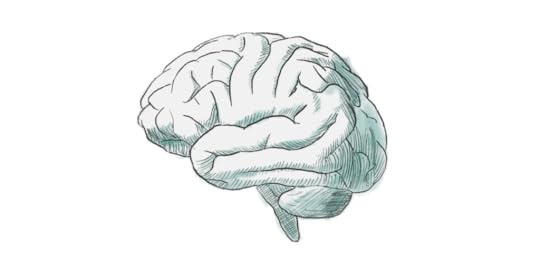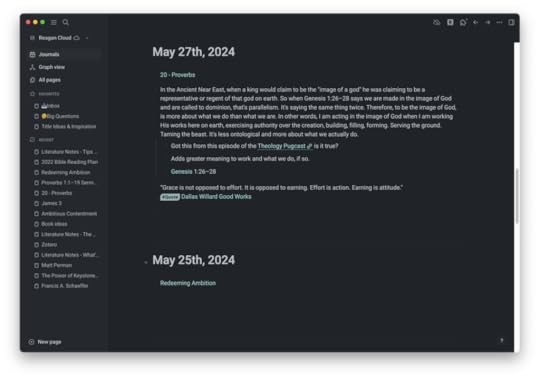Transhumanism, Christian Productivity, and Why I Donât Use the Term âSecond Brainâ
In recent years, the concept of a digital “second brain” has gained traction in the world of self-improvement and among creative professionals. A second brain is a note-taking system designed to help you overcome information overload in the modern age.
Tiago Forte, author of Building a Second Brain, defines the problem a second brain is designed to overcome:
Anything you might want to accomplishâexecuting a project at work, getting a new job, learning a new skill, starting a businessârequires finding and putting to use the right information. Your professional success and quality of life depend directly on your ability to manage information effectively.[1]
The solution, we are told, is to create a second brain. Externalize and organize the information such that our note-taking system becomes an extension of ourselves. This all sounds great at first. But the concept of a second brain actually carries some serious worldview baggage, and Christians would be wise to approach the topic with discernment.[2]
But while I’m a big fan of personal knowledge management (PKM), I refuse to use the term second brain. As you’ll see the concept of a second brain purposefully carries worldview implications that believers should think twice about. More broadly, I trust this little exercise will help Christians to think more biblically about how they use technology for self-improvement and personal productivity, and the latent philosophical assumptions they may be unknowingly imbibing.
The Ultimate Purpose of Personal Knowledge Management
I recently spoke on how to create a note-taking system. And I noted how important it is to think carefully about the purpose for your PKM as you design it. Are you seeking to collect notes and references from which you will write a book, are you wanting to store recipes, save interesting quotes, or just manage your personal thoughts in a more organized manner? The purpose for your system will affect how you design and use it.
But what is the ultimate purpose of creating a personal knowledge management system or second brain? Here is how Tiago Forte answered that question in a 2022 interview.
The ultimate purpose of PKM is to usher in the era of transhumanism â the fusion of man and machine. I think we are destined to use technology to enhance and augment our natural abilities. We already use prosthetic devices to improve our eyesight, our hearing, and even the beating of our hearts. But we are only beginning to do the same with the most powerful capability of them all: thinking and the human mind. I see PKM as the early stages of this historic transition, using simple software and human behaviors to amplify our intelligence. Everything we want to do, achieve, have, or experience is limited only by our imagination and intelligence, which means if we find a way to do that, there is almost nothing we canât accomplish both as individuals and as a society.[3]
It sounds almost comically ambitious at first, as if my little collection of Apple Notes is somehow going to guide mankind into its utopian next phase of human evolution. But Tiago is serious. When he says “second brain,” he means it literally.
But what really struck me about this quote was the last line, â…if we find a way to do that, there is almost nothing we canât accomplish both as individuals and as a society.â
Now, why does that sound so familiar?
Oh yeah.
Then they said, âCome, let us build ourselves a city and a tower with its top in the heavens, and let us make a name for ourselves, lest we be dispersed over the face of the whole earth.â And the Lord came down to see the city and the tower, which the children of man had built. And the Lord said, âBehold, they are one people, and they have all one language, and this is only the beginning of what they will do. And nothing that they propose to do will now be impossible for them.
Genesis 11:4-6 (ESV)
Forte’s ultimate vision for personal knowledge management is a digital Tower of Babel. This is the philosophy of transhumanism. And it might sound a little kooky at first until you realize he is far from the only one who thinks this way about technology and personal improvement.
Transhumanism is the Religion of Silicon Valley Samsungâs Silicon Valley Office, Photo by NBBJ
Samsungâs Silicon Valley Office, Photo by NBBJThe scientific developments that helped build the West were a result of a Christian worldview. Look back to the writings of Bacon, Galileo, Kepler, Pascal, and Newton, and you see a drive to discover and innovate driven by their service to God. Louis Pasteur wrote, “The more I study nature, the more I stand amazed at the work of the Creator.â
But now in the post-Christian West our advancements are driven mostly by agnostics or atheists, many of whom are self-declared transhumanists. This is especially true in the world of technology. And it’s reflected in the fields in which they work. Areas like AI, bio-tech, reproductive technology, and life extension, are attempts to transcend mankind’s limitations. While the old scientists saw in the pursuit science a kind of worship of God, the new technologists seek only to make themselves into gods.
Transhumanism is the philosophy behind Elon Musk’s inter-planetary ambitions with SpaceX and Neuralink. It drives Sam Altman of OpenAI, the company behind ChatGPT. As far back as 2017 he was writing in hopeful terms about “the merge,”[4] a time when humans and AI would become deeply intertwined. Jeff Bezos of Amazon, has invested billions into biotech research to reverse aging, and views human mortality as a frontier to be conquered. And, over the past several years, Mark Zuckerberg has continually bet the Facebook farm on a series of transhumanistic projects like a virtual reality metaverse, life extension technology, and artificial intelligence.
But what exactly is transhumanism? âTranshumanism is a futuristic social movement. Its adherents believe that immortality is attainable in the corporeal world through the wonders of applied technology.â[5] Transhumanism is the religion of Silicon Valley. It’s salvation without confession of sin, without repentance, and without Christ. It’s man’s attempt to save himself. And while it may look and sound futuristic, the lie behind transhumanism is as old as mankind itself.
In the garden, mankind was sinless; perfect human beings. Adam and Eve weren’t fallen, but they were finite. Still the serpent deceived Eve with the promise of more. And it’s the same deception that drives transhumanism today, âye shall be as godsâ (Genesis 3:5, KJV).
Leading Transhumanist philosopher and politician Zoltan Istvan isnât shy about this fact, writing for the Huffington Post in 2016 he said:
We must force our evolution in the present day via our reasoning, inventiveness, and especially our scientific technology. In short, we must embrace transhumanismâthe radical field of science that aims to turn humans into, for lack of a better word, gods.[6]
And yet this kooky, sci-fi-sounding worldview is the dominant philosophy of the leaders driving the technological innovations shaping our world. And the transhumanists are shaping the way we think about how technology can help us become more productive.
This is something we have to keep in mind as we look at the latest tech innovations. Their makers and purveyors believe this world is our home, and all of their hopes are built on self-salvation via technology. But believers know that we don’t belong to this passing world (1 John 2:17). We have our hopes set higher.
âBut our citizenship is in heaven, and from it we await a Savior, the Lord Jesus Christ,â
Philippians 3:20 (ESV)
Okay, so what’s all this have to do with how you take notes?
The Christian Worldview and Your PKM A snapshot of my LogSeq PKM Daily Note
A snapshot of my LogSeq PKM Daily NotePersonal productivity, of which personal knowledge management is a sub-category, is a pursuit of self-improvement. And every philosophy of productivity contains a theology. Which means there are theological connotations even to how you think about your note-taking systems. My Notion app helps me stay organized and plan long-term goals, my Obsidian vault enables me to save and organize my notes for writing projects. But these systems are not a second brain. They may help me overcome certain obstacles, but they will never (and can never) enable me to transcend my creatureliness in the way Forte or the transhumanists suggest.
Technology can help us overcome certain limitations. My productivity tech stack genuinely helps me get more done, better fulfill my commitments, and even facilitates my spiritual habits that help me walk closely with the Lord. I believe we can, to a small degree, legitimately mitigate aspects of the curse on our work through the use of the common grace technology. But the transhumanist wants to draw a line that goes up and to the right, from small improvements in my organizing to transcendent übermensch. And not only is this impossible, I believe the pursuit itself is dishonoring to God.
This is about accepting our limits of creatureliness not as a problem to be overcome, but as good parts of God’s limited to design for us as humans. God has given limits to our minds. Some of our limits are the result of the noetic effects of the curse. But some of those limits are the God-designed aspects our finitude he gave us before sin ever entered the picture; limits intrinsic to humanity over which God declared “it is very good” (Genesis 1:31), and the same humanity Christ put on at His incarnation.
We give thanks to Him for the massive blessing of tools and technology that can help us in the task of stewarding our lives and vocations for His glory. And we recognize that even if they are designed by godless transhumanists, many of the innovations we have today and be used in a God-honoring way.
We can plunder the Egyptians of these common grace tech tools for the glory of God. But we’ve got to be sure we aren’t inadvertently packing their idols into our saddlebags along with the other treasures.
Use Tech; Donât Idolize It
So what can we do to avoid inadvertently importing transhumanist ideas into the way we think about our productivity technology? Let me leave you with five principles that may help.
We should accept technological advances as common grace gifts from God. He creates the blacksmith of the sword and the ravager who slays with it (Isaiah 54:16), and He is sovereign over both. Thus even godless transhumanists can create technology that is useful for believers.[7]We should acknowledge that human innovation in this world, though amazing at times, is marred by sin and the curse. Technology cannot save us, and it always comes with some negative side-effects. Don’t buy the hype; no technology is an unmitigated good.Technology can be used discerningly to aid in our sanctification. The printing press brought Bibles in our homes, my prayer app helps me remember prayer requests, my PKM helps me write articles for Christian readers. Digital note-taking apps, to-do lists, VPNs, and e-readers can be used wisely and productively to our advantage as believers.Always consider the telos of technology. Which is to say look to the ultimate purpose of any tech you are using. Seek to use it to overcome sin, seek to improve yourself as an act of stewardship, but do not seek to transcend essential human nature. There are limits to our humanity that are God-designed and good and not in need of improvement or transcendence. We are not God.Be a tech-realist. Technology is cool. But Christians musnât engage with technology as wide-eyed optimists awaiting a Silicon Savior. Nor do we reject all technology as though our Lord were not sovereign even over the hearts of unbelieving technologists. When it comes to technology, Christians operate as we have always had to in this fallen world, with trust in the goodness of Godâs creation, while simultaneously acknowledging the curse and manâs fallen nature. It’s only when we hold these two truths together, trusting in the indwelling Spirit to help us, that we can discern through the thorny maze of technology and productivity.Final ThoughtsWe live in an age of unprecedented digital opportunity. Tools that help us capture ideas and organize information are genuine blessings. But we must acknowledge that these tools are being shaped by worldviews that seek to redefine what it means to be human. The language of âsecond brains,â augmented minds, and human-AI fusion is more than mere marketing hype, it reflects a theology, one rooted in the transhumanist dream of transcendence apart from God.
As Christians, we must approach our personal knowledge management, and all of our productivity, not as a means of becoming gods, but as a way of better glorifying the One true God.
So take notes, organize your ideas, and improve your memory and creativity. But build your PKM not as a second brain, but as a tool of stewardship.
FootnotesTiago Forte, Building a Second Brain: A Proven Method to Organize Your Digital Life and Unlock Your Creative Potential (New York: Atria Books, 2022), 17.â©ï¸This isn’t a criticism of Forte’s PARA methodology, which I think is quite helpful. I am critiquing the transhumanistic assumptions Forte holds and others hold and which are connoted in the term second brain.â©ï¸Tiago Forte, âBuilding a Second Brain: An Interview with Tiago Forteâ The Bullet Journalist (Bullet Journal), June 13, 2022.â©ï¸Sam Altman, âThe Merge.â Sam Altmanâs Blog, Decemberâ¯7,â¯2017.â©ï¸Wesley J. Smith, âThe Impossibility of Christian Transhumanismâ First Things, March 24, 2022â©ï¸Zoltan Istvan, âTranshumanism and Our Outdated Biologyâ HuffPost, April 21, 2016.â©ï¸See Tony Reinke’s God, Technology, and the Christian Life for more on how Isaiah 54 elucidates God’s providence over technology even in the hands of the ungodly.â©ï¸.numbered-list-yo {list-style:numbered!important;}


